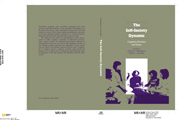Book contents
- Frontmatter
- Contents
- Contributors
- Preface and acknowledgments
- Introduction: The self–society dynamic
- 1 Exploring the relevance of social cognition for the relationship of self and society: Linking the cognitive perspective and identity theory
- 2 Toward a sociology of cognition
- 3 The cerebral self: Thinking and planning about identity-relevant activity
- 4 Growing up: The development and acquisition of social knowledge
- 5 The social contexts of self-feeling
- 6 Self-processes and emotional experiences
- 7 An affect control view of cognition and emotion
- 8 The self-concept as a basis for a theory of motivation
- 9 Attitudes, behavior, and the self
- 10 From changing selves toward changing society
- 11 Possible selves and social support: Social cognitive resources for coping and striving
- 12 Is the road to helping paved with good intentions? Or inertia?
- 13 Social structure and the moral self
- 14 The production of selves in personal relationships
- 15 Conclusion
- Indexes
12 - Is the road to helping paved with good intentions? Or inertia?
Published online by Cambridge University Press: 23 September 2009
- Frontmatter
- Contents
- Contributors
- Preface and acknowledgments
- Introduction: The self–society dynamic
- 1 Exploring the relevance of social cognition for the relationship of self and society: Linking the cognitive perspective and identity theory
- 2 Toward a sociology of cognition
- 3 The cerebral self: Thinking and planning about identity-relevant activity
- 4 Growing up: The development and acquisition of social knowledge
- 5 The social contexts of self-feeling
- 6 Self-processes and emotional experiences
- 7 An affect control view of cognition and emotion
- 8 The self-concept as a basis for a theory of motivation
- 9 Attitudes, behavior, and the self
- 10 From changing selves toward changing society
- 11 Possible selves and social support: Social cognitive resources for coping and striving
- 12 Is the road to helping paved with good intentions? Or inertia?
- 13 Social structure and the moral self
- 14 The production of selves in personal relationships
- 15 Conclusion
- Indexes
Summary
With the current emphasis within psychological social psychology on cognitive processes, and within sociological social psychology on the self, social psychology has largely ignored the concept of habit. Identity theorists (Burke, this volume; Burke & Tully, 1981; McCall & Simmons, 1978; Stryker, 1980, this volume; Turner, 1978; Turner & Billings, this volume) have used only the concepts of role-identity salience, role-person merger, and the like, which suggest conscious thought in relationship to action. The popular psychological theory of reasoned action (Fishbein & Ajzen, 1975; Ajzen & Fishbein, 1980) includes only attitudes, subjective norms, and intentions as predictors of behavior. Attribution theory (Kelley, 1967; Jones and Davis, 1965; Weiner, Russell, & Lerman, 1978) until very recently has assumed a very active, analytic “lay scientist” model of social information processing and action.
Habit as a concept was popular among the early theorists in sociology but fell out of favor with the rise of Watsonian behaviorism in psychology (Camic, 1986). I will use habit here to mean actions that “are relatively unmotivated” (Giddens, 1979: 218), actions in which “means-ends relations … are [from the actor's standpoint] not subject to argument” (Hartmann, 1939: 91). Following Camic (1986: 1,044) “the term ‘habit’ generally denominates a more-or-less self-actuating disposition or tendency to engage in a previously adopted or acquired form of action.” I am not suggesting that such behavior is mechanical or lacking in meaning, in the sense used by symbolic interactionists.
- Type
- Chapter
- Information
- The Self-Society DynamicCognition, Emotion and Action, pp. 259 - 280Publisher: Cambridge University PressPrint publication year: 1991
- 9
- Cited by

